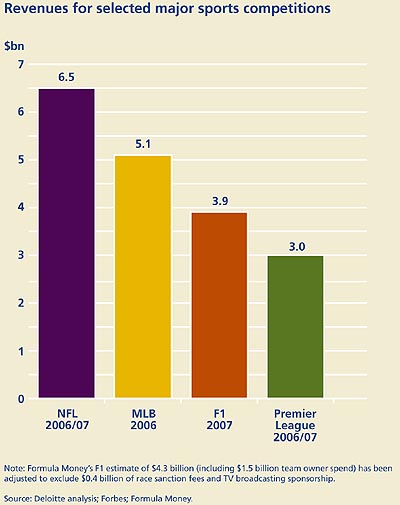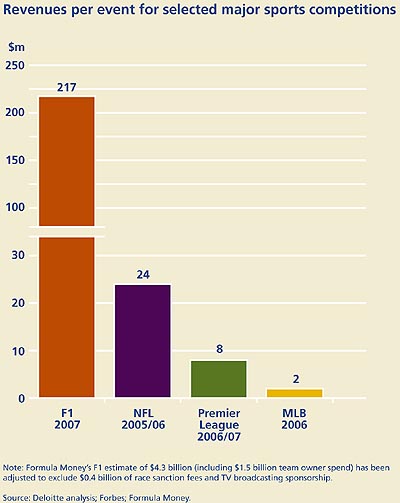


18/03/2008
NEWS STORY
 |
Formula 1 boasts the world's highest revenue generating annual sporting events, with the 18 Grands Prix in 2007 having an average revenue of £108m ($217m). This compares with per game values of £11.9m ($24m) in the NFL, £3.9 ($8m) in the FA Premier League and £1m ($2m) in the MLB.
At absolute revenue levels, F1's global revenues of £1.9bn ($3.9bn) (Source: Formula Money) mean only the NFL (£3.2bn/$6.5bn in 2006) and MLB (£2.5bn/$5.1bn in 2006) earn more revenue, albeit from a substantially higher number of events. The Premier League clubs' combined revenue was £1.4bn ($3bn) in the 2006/07 season.
The £1.9bn billion is comprised of central revenues (from broadcasting, race sponsorship and corporate hospitality), team revenues (including sponsorship and contributions from their commercial partners and owners) and circuit revenues (from ticketing and certain sponsorships).
F1 continues to broaden its global appeal with an increased geographic spread of Grand Prix races around the world a key part of this strategy. While Europe still stages the majority of races (10 of 18), Asia now stages five races and will this season host the first ever F1 night race in Singapore at the end of September.
The global appeal of F1, both in revenue and audience terms, means that F1 can truly be considered one of the major global sports.
Alan Switzer, Director in the Sports Business Group at Deloitte said, "Global revenues of more than $3.9 billion and total viewing figures in excess of 350 million for the 2007 season make impressive reading and with measures such as the future Asian expansion, development of more 'local heroes' (potentially in India and China) and the introduction of night racing we would expect these figures to continue to rise."
The tables illustrate how F1's revenues compare with those of selected other major annual sports competitions.
Compared with many other major sports F1 brings in a much lower proportion of its revenues from spending by event day attendees. Ticket receipts and other attendee secondary spend currently represent only around 10% of total revenue.
The circuits, supported by F1, are seeking to increase such revenues. Indeed such increases can form an important part of the funding mix for the redevelopment of existing circuits - including helping Silverstone to retain its Grand Prix in 2010 and beyond.
In addition to the night race, the 2008 season also sees the elimination of driver aids such as traction control which F1 hopes will continue to make the F1 brand attractive to both sponsors and audiences, live and on TV.
Stephen Dunham, Senior Consultant in the Sports Business Group comments further: "While F1 is already a sporting financial superpower, issues such as the location of Grands Prix, sanction fees to host races, team costs, sponsorship deals and environmental aspects must constantly be evaluated if F1 is to continue to maximise its audience appeal, brand value, and ultimately revenues."
 |